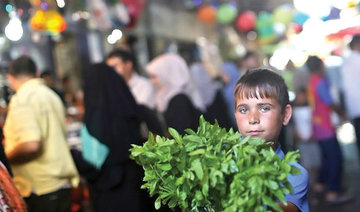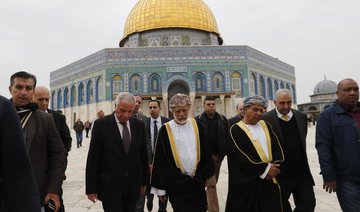JERUSALEM: Ministers Sunday greenlighted a bill allowing Israel to withhold tax monies it collects for the Palestinian Authority by the same amount as stipends that the PA pays to jailed militants.
Defense Minister Avigdor Lieberman, whose ministry drafted the bill, welcomed the vote in a ministerial committee, the first step toward sending it to parliament to be passed into law.
“Soon there will be an end to this theater of absurd,” he wrote in Hebrew on Twitter, adding that the money confiscated would be used “to prevent terror and compensate victims.”
Israel annually collects around $127 million in customs duties levied on goods destined for Palestinian markets that transit through Israeli ports monthly and then transfers it to the PA.
It has withheld payment in the past, notably in response to Palestinian admission in 2011 to the UN cultural agency UNESCO as a full member.
The Israeli move comes as the US Senate considers a bill approved by the House of Representatives to withhold aid to the PA if it does not stop the controversial practice of so-called martyr payments to families of Palestinians convicted of terrorist attacks.
Republican and Democratic US lawmakers alike have warned that the payments incentivise violence and serve as a sticking point in the Middle East peace process.
According to the Israeli bill, Lieberman will present an annual report detailing payments to “terror activists” and their families granted by the Palestinian Authority,” his office said.
“Based on the report, the sum will be deducted from payments handed from Israel to the Palestinian Authority.”
The bill will now face a series of parliamentary debates and votes before being finalized.
The Palestinian government slammed the move, calling it “piracy and theft” as well as a breach of international law, official news agency WAFA said.
The American legislation, called the Taylor Force Act, is named after a US military veteran and graduate student, age 28, who was killed in a 2016 attack while he was visiting Israel. The attacker, a Palestinian, was killed by police.
Israel advances bill cutting Palestinian funding over ‘terror’
Israel advances bill cutting Palestinian funding over ‘terror’

Hezbollah downs Israeli drone over Lebanon with missile

In a statement, Hezbollah said it downed a Hermes 900 drone in solidarity with Gaza, where Israel has been waging an almost eight-month-old war against Hamas, another Iranian-backed group.
Video circulated online appeared to show a plane of a size corresponding to that of a Hermes, aflame and gyring earthward.
Israel pounds Gaza after Biden outlines ceasefire plan

- Israel’s Benjamin Netanyahu insists on Hamas ‘destruction as part of plan to end Gaza war
- UN chief ‘strongly hopes’ latest development would lead to an agreement for lasting peace
RAFAH, Palestinian Territories: Israeli forces hammered Rafah in southern Gaza with tanks and artillery Saturday, hours after US President Joe Biden said Israel was offering a new roadmap toward a full ceasefire.
Shortly after Biden’s announcement, Israeli Prime Minister Benjamin Netanyahu insisted his country would still pursue the war until it had reached all its aims, including the destruction of Hamas.
Netanyahu on Saturday insisted on Hamas’s destruction as part of an Israeli plan presented by US President Joe Biden to end the Gaza war.
“Israel’s conditions for ending the war have not changed: the destruction of Hamas’s military and governing capabilities, the freeing of all hostages and ensuring that Gaza no longer poses a threat to Israel,” the Israeli leader said in a statement.
“Under the proposal, Israel will continue to insist these conditions are met before a permanent ceasefire is put in place.
“The notion that Israel will agree to a permanent ceasefire before these conditions are fulfilled is a non-starter,” Netanyahu added.
Israel’s opposition leader on Saturday urged Netanyahu to heed US President Joe Biden’s call for a Gaza truce under which Hamas would free hostages, and offered to support the government should far-right coalition partners bolt.
“The government of Israel cannot ignore President Biden’s consequential speech. There is a deal on the table and it should made,” Yair Lapid said in an X post.
“I remind Netanyahu that he has a safety net from us for a hostage-release deal if (Itamar) Ben-Gvir and (Bezalel) Smotrich leave the government.”
The Palestinian militant group, meanwhile, said it “considers positively” the plan laid out by Biden.
In his first major address outlining a possible end to the conflict, the US president said Israel’s three-stage offer would begin with a six-week phase that would see Israeli forces withdraw from all populated areas of Gaza.
It would also see the “release of a number of hostages, including women, the elderly, the wounded, in exchange for (the) release of hundreds of Palestinian prisoners.”
Israel and the Palestinians would then negotiate during those six weeks for a lasting ceasefire — but the truce would continue while the talks remained underway, Biden said.
The US leader urged Hamas to accept the Israeli offer. “It’s time for this war to end, for the day after to begin,” he said, in comments echoed by British Foreign Secretary David Cameron.
Hamas in a statement on Friday evening said it “considers positively” Biden’s speech regarding “a permanent ceasefire, the withdrawal of Israeli forces from Gaza, reconstruction and the exchange of prisoners.”
US Secretary of State Antony Blinken called his counterparts from Jordan, Saudi Arabia and Turkiye on Friday to press the deal.
UN chief Antonio Guterres “strongly hopes” the latest development “will lead to an agreement by the parties for lasting peace,” his spokesman Stephane Dujarric said.
German Foreign Minister Annalena Baerbock said the Israeli offer “provides a glimpse of hope and a possible path out of the war’s deadlock,” while EU chief Ursula von der Leyen welcomed a “balanced and realistic” approach to end the bloodshed.
But Netanyahu took issue with Biden’s presentation of what was on the table, insisting the transition from one stage to the next in the proposed roadmap was “conditional” and crafted to allow Israel to maintain its war aims.
“The prime minister authorized the negotiating team to present an outline for achieving (the return of hostages), while insisting that the war will not end until all of its goals are achieved,” Netanyahu’s office said.
Those aims included “the return of all our hostages and the elimination of Hamas’s military and governmental capabilities,” it added.
“The exact outline proposed by Israel, including the conditional transition from stage to stage, allows Israel to maintain these principles.”
Israel has repeatedly vowed to destroy Hamas since the Palestinian militant group attacked southern Israel on October 7.
Israel sent tanks and troops into Rafah in early May, ignoring concerns over the safety of displaced Palestinian civilians sheltering in the city on the Egyptian border.
Before the Rafah offensive began, the United Nations said up to 1.4 million people were sheltering in the city.
Since then, one million have fled the area, the UN agency for Palestinian refugees, UNRWA, has said.
The Israeli seizure of the Rafah crossing has further slowed sporadic deliveries of aid for Gaza’s 2.4 million people and effectively shuttered the territory’s main exit point.
Israel said last week that aid deliveries had been stepped up.
But Blinken acknowledged on Friday that the humanitarian situation was “dire” despite US efforts to bring in more assistance.
The World Food Programme said daily life had become “apocalyptic” in parts of southern Gaza since Israel began its assault on Rafah in early May.
The Gaza war was sparked by Hamas’s unprecedented October 7 attack on southern Israel, which resulted in the deaths of 1,189 people, mostly civilians, according to an AFP tally based on Israeli official figures.
Militants also took 252 hostages, 121 of whom remain in Gaza, including 37 the army says are dead.
Israel’s retaliatory offensive has killed at least 36,284 people in Gaza, mostly civilians, according to the Hamas-run territory’s health ministry.
In northern Gaza, witnesses said that after carrying out a three-week operation in the town of Jabalia and its neighboring refugee camp, troops had ordered residents of nearby Beit Hanun to evacuate ahead of an imminent assault.
The Israeli army said troops “completed their mission in eastern Jabalia and began preparation for continued operations in the Gaza Strip.”
– with Reuters
Iran condemns EU sanctions over drone program

TEHRAN: Iran on Saturday criticized the European Union’s imposition of new sanctions on high-ranking officials and the Revolutionary Guards for supplying drones to Russia and its Middle East allies.
The EU’s measures unveiled on Friday target Iran’s Defense Minister Mohammad Reza Ashtiani and Esmail Qaani, the commander of the Guards’ foreign operations arm, the Quds Force, among others.
The sanctions also target an armed forces command center, the head of a state aviation firm and the Kavan Electronics Behrad company.
The Islamic republic’s foreign ministry described the move as “regrettable,” saying they were based on “repeated, absurd, and baseless excuses and accusations.”
“The European Union... once again resorted to the obsolete and ineffective tool of sanctions against the powerful Iran,” ministry spokesman Nasser Kanani said in a statement.
The sanctions forbid any EU citizen or company from engaging in business with the listed individuals and organizations.
The United States and its allies including Israel accuse Iran of providing fleets of drones to its allies in the Middle East, notably to Lebanese Shiite group Hezbollah and the Houthi rebels in Yemen.
Kyiv and its Western allies also accuse Iran of providing Russia with drones for use in the Ukraine war, a claim the Islamic republic denies.
Israel maintains a shadowy hospital in the desert for Gaza detainees. Critics allege mistreatment

- The military denies the allegations of inhumane treatment and says all detainees needing medical attention receive it
- While Israel says it detains only suspected militants, many patients have turned out to be non-combatants taken during raids, held without trial
JERUSALEM: Patients lying shackled and blindfolded on more than a dozen beds inside a white tent in the desert. Surgeries performed without adequate painkillers. Doctors who remain anonymous.
These are some of the conditions at Israel’s only hospital dedicated to treating Palestinians detained by the military in the Gaza Strip, three people who have worked there told The Associated Press, confirming similar accounts from human rights groups.
While Israel says it detains only suspected militants, many patients have turned out to be non-combatants taken during raids, held without trial and eventually returned to war-torn Gaza.
Eight months into the Israel-Hamas war, accusations of inhumane treatment at the Sde Teiman military field hospital are on the rise, and the Israeli government is under growing pressure to shut it down. Rights groups and other critics say what began as a temporary place to hold and treat militants after Oct. 7 has morphed into a harsh detention center with too little accountability.
The military denies the allegations of inhumane treatment and says all detainees needing medical attention receive it.
The hospital is near the city of Beersheba in southern Israel. Of the three workers interviewed by AP, two spoke on condition of anonymity because they feared government retribution and public rebuke.
“We are condemned by the left because we are not fulfilling ethical issues,” said Dr. Yoel Donchin, an anesthesiologist who has worked at Sde Teiman hospital since its earliest days and still works there. “We are condemned from the right because they think we are criminals for treating terrorists.”
The military this week said it formed a committee to investigate detention center conditions, but it was unclear if that included the hospital. Next week Israel’s highest court is set to hear arguments from human rights groups seeking to shut it down.
Israel has not granted journalists or the International Committee of the Red Cross access to the Sde Teiman facilities.
Israel has detained some 4,000 Palestinians since Oct. 7, according to official figures, though roughly 1,500 were released after the military determined they were not affiliated with Hamas. Israeli human rights groups say the majority of detainees have at some point passed through Sde Teiman, the country’s largest detention center.
Doctors there say they have treated many who appeared to be non-combatants.
“Now we have patients that are not so young, sick patients with diabetes and high blood pressure,” said Donchin, the anesthesiologist.
A soldier who worked at the hospital recounted an elderly man who underwent surgery on his leg without pain medication. “He was screaming and shaking,” said the soldier.
Between medical treatments, the soldier said patients were housed in the detention center, where they were exposed to squalid conditions and their wounds often developed infections. There was a separate area where older people slept on thin mattresses under floodlights, and a putrid smell hung in the air, he said.
The military said in a statement that all detainees are “reasonably suspected of being involved in terrorist activity.” It said they receive check-ups upon arrival and are transferred to the hospital when they require more serious treatment.
A medical worker who saw patients at the facility in the winter recounted teaching hospital workers how to wash wounds.
Donchin, who largely defended the facility against allegations of mistreatment but was critical of some of its practices, said most patients are diapered and not allowed to use the bathroom, shackled around their arms and legs and blindfolded.
“Their eyes are covered all the time. I don’t know what the security reason for this is,” he said.
The military disputed the accounts provided to AP, saying patients were handcuffed “in cases where the security risk requires it” and removed when they caused injury. Patients are rarely diapered, it said.
Dr. Michael Barilan, a professor at the Tel Aviv University Medical School who said he has spoken with over 15 hospital staff, disputed accounts of medical negligence. He said doctors are doing their best under difficult circumstances, and that the blindfolds originated out of a “fear (patients) would retaliate against those taking care of them.”
Days after Oct. 7, roughly 100 Israelis clashed with police outside one of the country’s main hospitals in response to false rumors it was treating a militant.
In the aftermath, some hospitals refused to treat detainees, fearful that doing so could endanger staff and disrupt operations.
As Israel pulled in scores of wounded Palestinians to Sde Teiman, it became clear the facility’s infirmary was not large enough, according to Barilan. An adjacent field hospital was built from scratch.
Israel’s Health Ministry laid out plans for the hospital in a December memo obtained by AP.
It said patients would be treated while handcuffed and blindfolded. Doctors, drafted into service by the military, would be kept anonymous to protect their “safety, lives and well-being.” The ministry referred all questions to the military when reached for comment.
Still, an April report from Physicians for Human Rights-Israel, drawing on interviews with hospital workers, said doctors at the facility faced “ethical, professional and even emotional distress.” Barilan said turnover has been high.
Patients with more complicated injuries have been transferred from the field hospital to civilian hospitals, but it has been done covertly to avoid arousing the public’s attention, Barilan said. And the process is fraught: The medical worker who spoke with AP said one detainee with a gunshot wound was discharged prematurely from a civilian hospital to Sde Teiman within hours of being treated, endangering his life.
The field hospital is overseen by military and health officials, but Donchin said parts of its operations are managed by KLP, a private logistics and security company whose website says it specializes in “high-risk environments.” The company did not respond to a request for comment.
Because it’s not under the same command as the military’s medical corps, the field hospital is not subject to Israel’s Patients Rights Act, according to Physicians for Human Rights-Israel.
A group from the Israeli Medical Association visited the hospital earlier this year but kept its findings private. The association did not respond to requests for comment.
The military told AP that 36 people from Gaza have died in Israel’s detention centers since Oct. 7, some of them because of illnesses or wounds sustained in the war. Physicians for Human Rights-Israel has alleged that some died from medical negligence.
Khaled Hammouda, a surgeon from Gaza, spent 22 days at one of Israel’s detention centers. He does not know where he was taken because he was blindfolded while he was transported. But he said he recognized a picture of Sde Teiman and said he saw at least one detainee, a prominent Gaza doctor who is believed to have been there.
Hammouda recalled asking a soldier if a pale 18-year-old who appeared to be suffering from internal bleeding could be taken to a doctor. The soldier took the teenager away, gave him intravenous fluids for a few hours, and then returned him.
“I told them, ‘He could die,’” Hammouda said. “‘They told me this is the limit.’”
UAE field hospital in Gaza provides medical aid to patients

DUBAI: The UAE’s field hospital in Gaza has continued its medical services for Gaza residents amid the crisis in Rafah.
Dr. Saif Al-Mehrzi, an orthopaedic surgery consultant at the UAE hospital in Rafah, said that the hospital continued to receive injured women and children and those with chronic illnesses.
The hospital’s medical team carried out several operations, including a metal implant removal and an endoscopy on an inflamed wound for a patient suffering from war-caused fractures, which helped to save his limbs from amputation.
The patient had been suffering from complications since undergoing surgery last October.
Operation Chivalrous Knight 3 provides humanitarian assistance to displaced persons in the Gaza Strip through food parcels, children’s and women’s parcels, pillows, tents, vegetables and water.

















